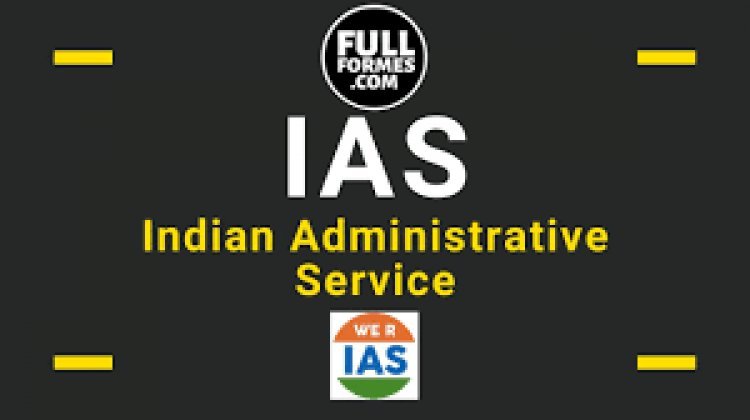what is the full form of IAS
The acronym "IAS" stands for "Indian Administrative Service." It is one of the prestigious civil services in India and is considered the premier administrative branch of the Indian government. The IAS plays a crucial role in the governance and administration of the country.

what is the full form of IAS
The acronym "IAS" stands for "Indian Administrative Service." It is one of the prestigious civil services in India and is considered the premier administrative branch of the Indian government. The IAS plays a crucial role in the governance and administration of the country.
The Indian Administrative Service was established in 1947, following India's independence from British colonial rule. The IAS is part of the All India Services, which also include the Indian Police Service (IPS) and the Indian Forest Service (IFS). These services are meant to provide a highly skilled and competent cadre of civil servants to serve the government at both the central and state levels.
To explore the full meaning and significance of IAS, let's delve into its history, selection process, roles and responsibilities, training, challenges, and impact on Indian society.
History of IAS: The concept of a unified administrative service dates back to the British colonial era when the Indian Civil Service (ICS) was established in 1858. The ICS served as the backbone of British administration in India, and it recruited top graduates from England through a competitive examination. After India gained independence in 1947, the ICS was disbanded, and the IAS was created to serve as its Indian counterpart.
Selection Process: The selection process for the Indian Administrative Service is highly competitive and rigorous. The Union Public Service Commission (UPSC) conducts the Civil Services Examination (CSE), which is a three-stage examination process:
-
Preliminary Examination: This is an objective type exam consisting of two papers: General Studies Paper-I and General Studies Paper-II (also known as the Civil Services Aptitude Test or CSAT). The preliminary exam serves as a screening test to shortlist candidates for the mains examination.
-
Main Examination: The main exam is a written examination consisting of nine papers, out of which seven are considered for ranking. These papers cover various subjects, including essay writing, general studies, and optional subjects chosen by the candidates. The main examination evaluates the candidates' depth of knowledge and analytical skills.
-
Interview (Personality Test): Candidates who qualify the main examination are called for an interview conducted by a panel of experts. The interview assesses the candidates' suitability for a career in civil services, including their mental agility, ethical and moral integrity, and communication skills.
Roles and Responsibilities: IAS officers are responsible for the implementation and administration of government policies and programs. They hold key positions in various government departments and ministries, both at the central and state levels. Some of their key roles and responsibilities include:
-
Policy Formulation and Implementation: IAS officers are involved in the formulation of policies and their effective implementation. They play a crucial role in bridging the gap between the government's vision and its execution on the ground.
-
District Administration: At the beginning of their career, IAS officers serve as Assistant Collectors or Sub-Divisional Magistrates in districts. They are responsible for maintaining law and order, implementing development projects, and addressing various issues faced by the local population.
-
Development and Welfare: IAS officers work on various development projects, including infrastructure development, healthcare, education, and poverty alleviation programs. They collaborate with other government officials, non-governmental organizations, and the private sector to ensure holistic development.
-
Regulatory Functions: IAS officers also handle regulatory functions, including ensuring compliance with laws and regulations, conducting inspections, and managing administrative processes.
-
Crisis Management: During natural disasters, emergencies, and other crises, IAS officers are at the forefront of coordinating relief and rehabilitation efforts. Their ability to handle such situations efficiently is crucial for saving lives and minimizing damage.
Training and Professional Development: After successfully clearing the Civil Services Examination, candidates undergo training at the Lal Bahadur Shastri National Academy of Administration (LBSNAA) in Mussoorie, India. The training period is designed to equip them with the necessary skills and knowledge to effectively discharge their duties. The training includes both classroom sessions and field visits, covering various aspects of governance, administration, public policy, and leadership.
Challenges Faced by IAS Officers: IAS officers often face a range of challenges in their roles, given the complexities of governance and administration in India:
-
Bureaucratic Hurdles: The bureaucratic structure can sometimes hinder the swift execution of policies and projects. IAS officers need to navigate through administrative processes and red tape to achieve desired outcomes.
-
Political Pressures: IAS officers often find themselves at the crossroads of political demands and administrative neutrality. Balancing political expectations with the ethical obligation to serve the public interest can be challenging.
-
Resource Constraints: Limited resources can pose challenges in delivering effective governance and development, especially in remote and underserved areas.
-
Accountability: IAS officers are accountable for their decisions and actions. Balancing accountability with the need for innovation and risk-taking can be a delicate task.
-
Dynamic Environment: The rapidly changing socio-economic and political landscape requires IAS officers to constantly adapt and stay updated on various issues and trends.
Impact on Indian Society: The Indian Administrative Service plays a vital role in shaping Indian society and governance. IAS officers are instrumental in implementing policies that affect millions of citizens. Their decisions impact areas such as education, healthcare, infrastructure, poverty alleviation, and more. By ensuring the effective implementation of government programs, IAS officers contribute to social development and nation-building.
In conclusion, the Indian Administrative Service (IAS) stands as a cornerstone of India's administrative machinery. Its history, selection process, roles and responsibilities, training, challenges, and impact on society all contribute to its significance. As India continues to evolve and tackle various challenges, the IAS remains a key institution in driving positive change and effective governance.

 shubhammore
shubhammore 














